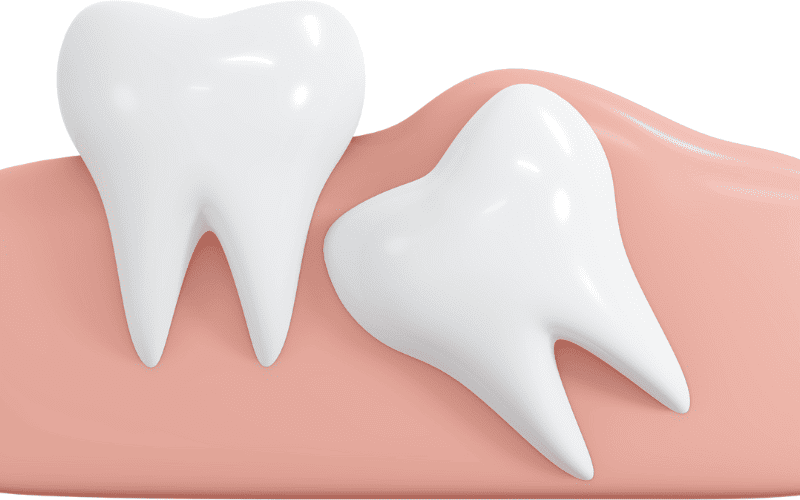ONLINE SCHEDULING AND VIRTUAL CONSULTS AVAILABLE

Wisdom Tooth Extraction Problems To Watch For After Surgery

Undergoing wisdom tooth extraction can be both a relief and a cause for concern. While the removal of these third molars is a common dental procedure, the aftermath can pose a unique set of challenges that require attention and care. In this blog, we delve into the realm of post-surgery complications, shedding light on the wisdom tooth extraction problems that may arise and providing insights on how to navigate through them.
Swelling And Discomfort
After wisdom tooth extraction, it’s normal to experience mild swelling and discomfort around the surgical site. This is a natural response to the trauma of the procedure. To manage these expected symptoms, it’s crucial to apply ice packs intermittently during the first 24 hours. Additionally, following the prescribed pain medications provided by your dentist will help alleviate discomfort. However, if the swelling persists beyond the initial days or becomes excessive, it could indicate potential complications such as infection or inadequate healing. In such cases, promptly reaching out to your dentist is essential for a thorough evaluation and appropriate intervention.
Bleeding Issues
Some bleeding is anticipated immediately after wisdom tooth extraction. Typically, bleeding should diminish within the first 24 hours as the blood clot forms and the healing process begins. It’s important to follow post-operative instructions, including biting down on gauze as advised by your dentist. If bleeding persists or increases after the initial 24-hour period, it might signal complications such as a dislodged blood clot or issues with the healing process. In such instances, it’s crucial to contact your dentist promptly for further assessment and necessary action.
Infection Concerns
While infections after wisdom tooth extraction are rare, being vigilant for potential signs is crucial for early detection and intervention. Watch for persistent pain, swelling, redness, or discharge around the surgical site, as these may indicate an infection. In the event of any of these symptoms, it’s imperative to seek immediate dental attention. Timely treatment can prevent the infection from spreading and causing more severe complications, ensuring a smoother recovery process.
Nerve Damage Awareness
Although infrequent, nerve damage can occur during the extraction process, leading to numbness, tingling, or altered sensation in the tongue, lips, or cheeks. Any persistent changes in sensation should be reported to your dentist for further evaluation and appropriate management.
Dry Socket Dilemma
A dry socket is a painful condition that can occur after wisdom tooth extraction. It happens when the blood clot that normally forms in the extraction site either dislodges or dissolves prematurely. This exposes the underlying nerves and bone, leading to intense pain and discomfort. Symptoms may include severe pain, bad breath, and an unpleasant taste. If you experience these symptoms beyond the initial healing days, it’s essential to seek prompt intervention from your dentist. Wisdom tooth extraction in Plantation, FL, can alleviate the pain and promote proper healing by applying medicated dressings to the affected area.
Difficulty in Opening Mouth
Some individuals may experience difficulty fully opening their mouths after wisdom tooth extraction. This is usually a temporary issue caused by muscle stiffness or swelling. While it’s common to have some limitations in mouth opening immediately after surgery, persistent difficulty beyond a few days warrants attention. Consulting with your dentist allows them to assess the situation, ensuring there are no complications such as infection, jaw joint issues, or other underlying concerns. Addressing these issues early contributes to a smoother recovery process.
Persistent Fever
A low-grade fever immediately after surgery is common, but a persistent or high-grade fever could indicate infection. If your body temperature remains elevated beyond the initial recovery period, it’s essential to seek prompt medical attention to address the potential underlying issue.
Unusual Taste or Odor
An unusual taste or foul odor from the extraction site may indicate infection or inadequate oral hygiene. Maintaining proper oral care and promptly reporting such issues to your dentist is crucial for optimal recovery and preventing the escalation of potential problems.
Allergic Reactions
Although rare, allergic reactions to medications prescribed post-surgery can occur. Monitoring for symptoms such as rashes, itching, or difficulty breathing is essential. In the event of any suspected allergic reaction, seeking immediate medical attention is paramount.
Follow-up Appointments Importance:
Scheduled follow-up appointments with your dentist play a vital role in monitoring your recovery progress. Even in the absence of apparent issues, attending these appointments ensures early identification of potential problems and allows for timely intervention, contributing to a successful and complication-free recovery.
While wisdom tooth extraction in Plantation, FL, is a routine procedure, understanding and recognizing potential post-surgery problems is crucial for a successful recovery. Regular communication with your dentist, adherence to post-operative care instructions, and swift action in case of any concerns are paramount. By staying vigilant and proactive, you can navigate the post-surgery phase with confidence, ensuring optimal oral health in the long run. Schedule an appointment with My Dentist For Life in Plantation, FL to get a healthy dental pair. Reach out to our dental office to know more.





